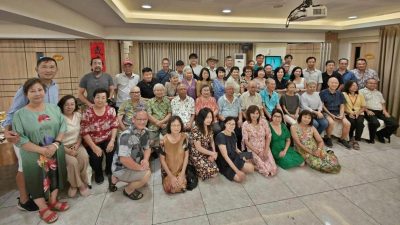By Nordin Abdullah

"A retreat to nasi lemak" is defined as an economic phenomenon which sees someone lose his job and in response "retreats" to making nasi lemak in the interim, as a way to generate income.
Another aspect in this phenomenon sees another individual loses his job and instead of dining out at a restaurant near the office picks up cheaper nasi lemak near the house.
The velocity of money still continues just at a lower level and within the cultural tapestry that is nasi lemak.
This snapshot of the grey economy keeps many people from falling below the poverty line, but it is hard to measure its full contribution to gross domestic product (GDP).
Of late, there have been too many stories of highly skilled professionals in this position; while heart-warming, it is not the best return on investment for those trained to operate in the global knowledge economy.
And from the government's perspective, it is increasingly difficult to monitor or generate revenue from these activities.
There are three parallel policy opportunities emerging to address this and to ensure the implementation of a sustainable future, namely, integrating the informal economy into the formal sector in a meaningful way, gearing up high value individuals to participate in the global gig economy, and attracting more foreign direct investments onshore.
Recent years have seen the digitization of certain services, in particular ride sharing, which is effective digitization that has led to a corresponding revenue model for the government.
This improves domestic business conditions but does not expand the economic pie with new money into the system and still represents a low value activity for highly qualified labor.
What about the global gig economy? Malaysia has a long history of achieving results in this field. Business process outsourcing (BPO) has seen billions flow into the country; in the context of the global gig economy, it just needs to be done in a more granular way to benefit those now available in the knowledge worker pool.
More importantly this will lead to foreign cash flowing directly to those experts.
The International Data Corporation (IDC) forecast that BPO will deliver some US$1.4 billion or RM5.8 billion in direct revenue in 2021 to the country, this on the back of mature telecommunications infrastructure and affordable high-speed internet services.
Professionals in the sector routinely deal with high levels of e-commerce, big data analytics, internet of things and smart technologies.
The skills are there, the infrastructure is there; the question is: can individual Malaysians turn around being one of the most interconnected social media nations into a marketplace for direct high-value services in the global gig economy?
The investment pathway is by far the most desired on many levels. It expands the economic base and addresses an identified gap.
The post-COVID-19 recovery will need to focus on investment opportunities in critical global supply chains to create a comparative advantage to regional competitors.
As MCO 3.0 enters a second stanza, the answer lies at the convergence of "the fierce urgency of now" and the "law of the vital few", starting with dusting off the Pareto Principle or the 80/20 rule which dictates that 80 per cent of production comes from 20 per cent of the population.
Coupled with words of Martin Luther King Jr., "In this unfolding conundrum of life and history, there 'is' such a thing as being too late. This is no time for apathy or complacency. This is a time for vigorous and positive action."
During any crisis there is always opportunity. To grasp that opportunity, it will take a strategic shift in thinking, a succinct recovery plan and rapid action by all.
Moving towards a sustainable future, the only time we should be talking about nasi lemak should be at a lunch break in international food security conference, as we share it with delegates from across the world as a cultural export.
After all, the diversity of products used in nasi lemak is quite extensive, with a value chain potentially involving hundreds of suppliers. A conversation for another day, post-COVID-19.
(Nordin Abdullah is Founding Chairman of Malaysia Global Business Forum.)
ADVERTISEMENT
ADVERTISEMENT


































